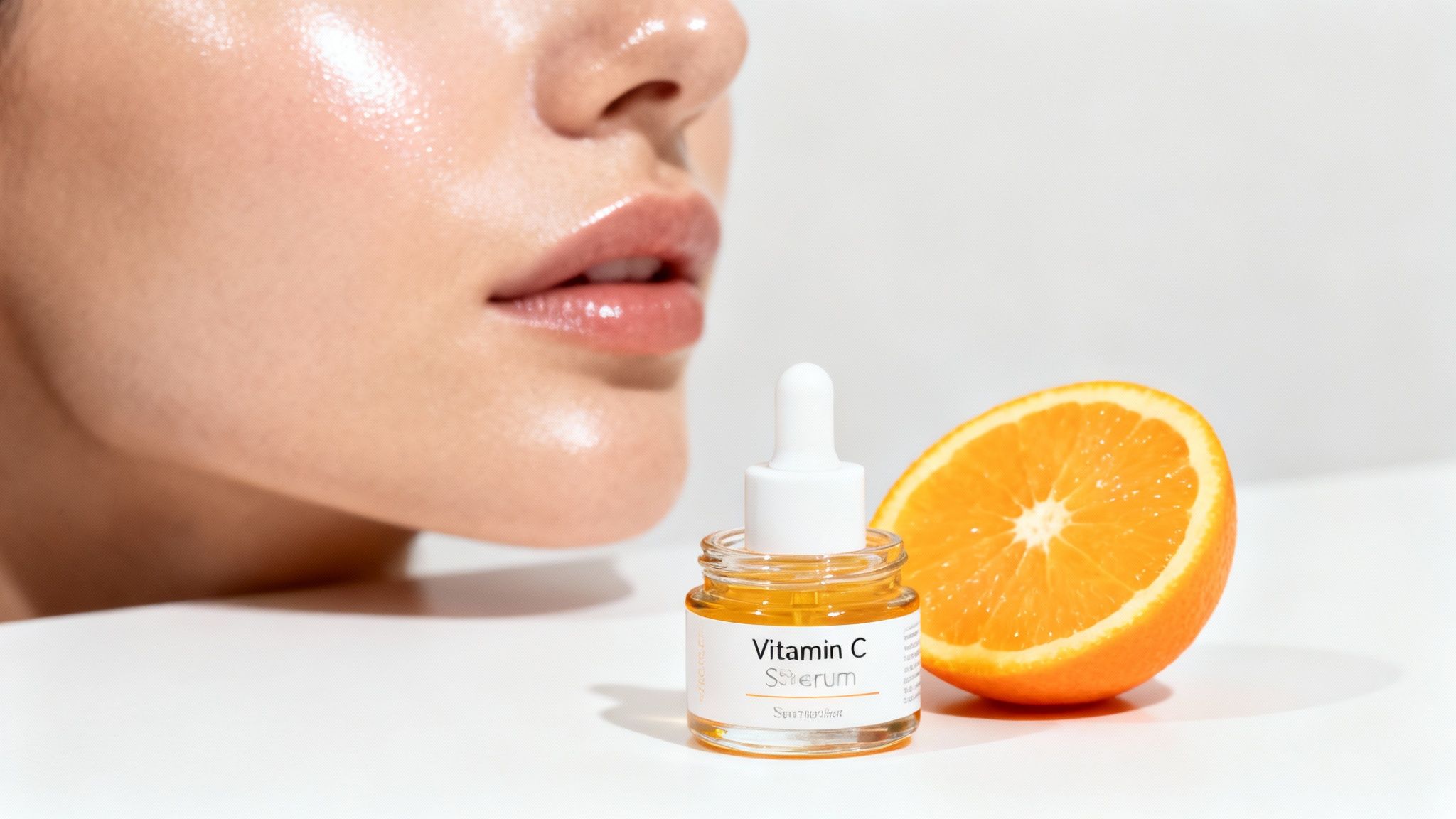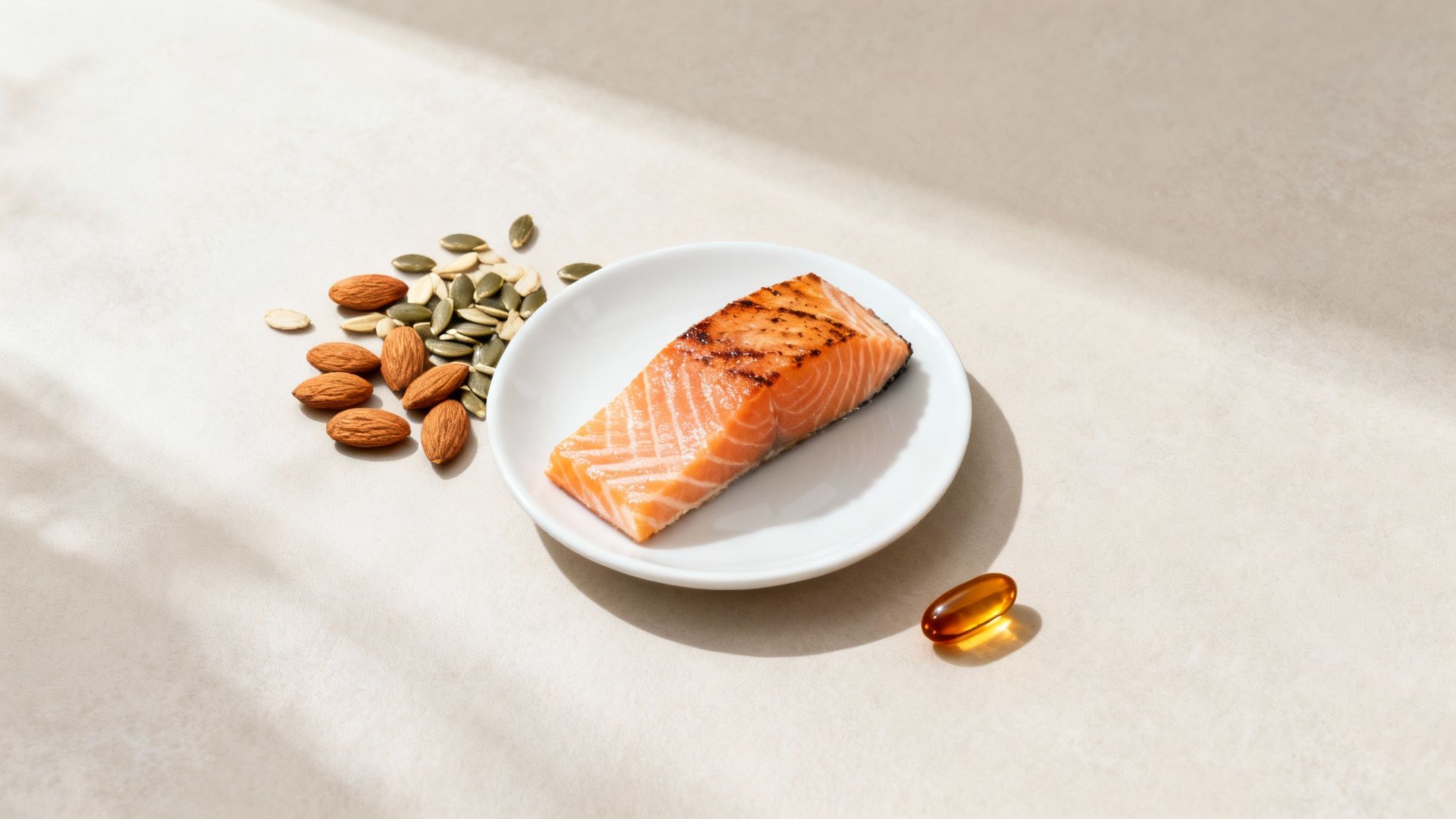
The Best Vitamins for Glowing Skin
Share
When it comes to getting that healthy, lit-from-within glow, the secret isn't just in the expensive creams and serums lining your bathroom shelf. The real magic starts on the inside. Think of vitamins as your internal skincare team, providing the essential building blocks your skin needs to repair itself, fend off daily environmental damage, and maintain its natural vibrancy.
The best vitamins for that radiant complexion are a powerhouse crew of antioxidants and cell-builders, including Vitamin C, A, E, and D. Together, these nutrients are the true foundation for healthy, luminous skin.
The Secret to a Truly Radiant Complexion
We all want that natural, healthy glow, but it's easy to forget that what we eat has a massive impact on our skin. A diet packed with colourful fruits and vegetables is always the best place to start. However, with busy modern lifestyles and the occasional dietary gap, it can be tough to consistently get the optimal amount of nutrients needed for visible results.
This is where smart supplementation can make a real difference, ensuring your skin has a steady supply of these vital nutrients to do its job properly.
So, how do they work? This guide breaks down exactly how these essential vitamins support a glowing complexion by:
- Protecting delicate skin cells from damage caused by UV rays and pollution.
- Firing up collagen production for firmer, plumper skin.
- Supporting the natural skin cell renewal process, keeping things fresh and bright.
Getting to grips with what each vitamin does is the first step toward building a routine that actually works for you. This concept map below gives you a quick visual of how these key vitamins work together to create healthy, glowing skin.

As you can see, a radiant complexion is built on the combined efforts of several key nutrients. Each one plays a unique and vital role in supporting cellular health from the ground up.
To help you get started, here's a quick rundown of our superstar skin vitamins, what they do best, and the best places to find them in your diet.
Your Quick Guide to Skin-Boosting Vitamins
This table highlights the top vitamins for your skin, their main job, and the best whole-food sources to add to your shopping list.
| Vitamin | Primary Skin Benefit | Best Food Sources |
|---|---|---|
| Vitamin A | Promotes cell turnover and smooths skin texture. | Sweet potatoes, carrots, spinach, kale. |
| Vitamin C | Boosts collagen production and fights free radicals. | Oranges, strawberries, bell peppers, broccoli. |
| Vitamin D | Calms inflammation and supports skin repair. | Fatty fish, fortified milk, mushrooms. |
| Vitamin E | Protects against oxidative stress and moisturises. | Almonds, sunflower seeds, avocados. |
By focusing on these nutrients through both diet and, where needed, supplementation, you're giving your skin the tools it needs to look and feel its absolute best.
How Vitamin A and C Renew Your Skin

When you start looking for the best vitamins for glowing skin, two names pop up again and again: Vitamin A and Vitamin C. Think of them as the ultimate tag team for your complexion. They work in powerful, yet distinct, ways to rebuild and protect your skin from the inside out, tackling everything from uneven texture to loss of firmness.
Vitamin A is essentially the accelerator for your skin’s natural renewal cycle. Its most famous forms, retinoids, are legendary for their ability to encourage old, dull skin cells to shed and make way for fresh, new ones underneath.
This constant, sped-up cell turnover is what helps to smooth out fine lines, shrink the appearance of pores, and create a much more even, polished skin surface. It’s like gently buffing your skin from within, revealing the brighter, more vibrant layers just waiting to emerge.
The Accelerator: Vitamin A for Cell Turnover
To get more Vitamin A into your diet, start thinking in colour. Your body cleverly converts beta-carotene from brightly coloured vegetables into the active form of Vitamin A it needs to support healthy skin.
- Sweet Potatoes: Just one medium sweet potato can pack well over 100% of your daily Vitamin A needs.
- Carrots: Famous for their beta-carotene content, they are a fantastic raw or cooked snack.
- Leafy Greens: Don't forget your greens! Spinach and kale are also brilliant sources that contribute to your skin’s health.
Making these foods a regular part of your meals ensures your body has the raw materials it needs for consistent cell regeneration. Over time, this leads to a visibly smoother and more youthful-looking complexion.
The Protector: Vitamin C for Collagen and Defence
While Vitamin A is busy rebuilding, Vitamin C steps in to protect and strengthen. It’s a master antioxidant, acting like a shield against the daily environmental damage from things like pollution and UV radiation. These aggressors create free radicals—unstable molecules that wreak havoc on skin cells and speed up the ageing process.
Vitamin C neutralises these threats, but its most critical job for glowing skin is its role in synthesising collagen. Collagen is the essential protein that provides structure and elasticity, keeping skin looking firm, plump, and resilient.
Without enough Vitamin C, your body simply cannot produce collagen efficiently. You can easily boost your intake through foods like citrus fruits, bell peppers, strawberries, and broccoli.
For a more targeted approach, applying a high-quality Skinsation Vitamin C Serum directly to the skin can seriously enhance brightness and renewal, working hand-in-hand with what you eat. A consistent supply from both your diet and your skincare routine is one of the most effective strategies for maintaining that coveted youthful glow.
Why Vitamin D Is Your Skin's Best Friend

We often hear Vitamin D called the "sunshine vitamin," but its incredible role in getting your skin to glow is frequently overlooked. This is a massive blind spot, especially for those of us in places like the UK where reliable sun is more of a wish than a reality.
Think of Vitamin D as your skin's on-site manager. It's in charge of overseeing how your skin cells grow, repair themselves, and mount an immune response, making sure the whole operation runs like a well-oiled machine.
Its superpower is calming inflammation, which is why it's one of the best vitamins for glowing skin if you're dealing with issues like acne or eczema. By keeping your skin's immune reactions in check, it helps dial down the redness and irritation that get in the way of a clear, balanced complexion.
The Challenge of Getting Enough Vitamin D
Here's the tricky part. Unlike other vitamins you can easily stock up on from your plate, Vitamin D is a bit elusive. Your body is actually designed to produce it itself when your skin gets a dose of UVB sunlight.
But for anyone living in the UK, getting enough sun all year round is a real challenge, particularly during the darker autumn and winter months. It creates a proper catch-22: we need sun for Vitamin D, but we all know that too much exposure comes with its own set of risks. This is why so many people can fall short, even if they're eating a healthy diet.
UK-based research really shines a light on how common this issue is. One study revealed that in winter, a staggering 60% of people with lighter skin were running low on Vitamin D. These kinds of seasonal and skin-type differences really highlight why a one-size-fits-all approach just doesn't work for maintaining skin health. You can read more about the research on Vitamin D levels in the UK here.
Why Supplementation Is a Smart Strategy
When you weigh up the difficulties of getting enough Vitamin D from sunlight and food alone, bringing in a high-quality supplement is often the most reliable move you can make. It's a simple way to keep your levels topped up through every season, supporting not just your skin but your overall well-being too.
By managing inflammation and supporting skin cell turnover, adequate Vitamin D helps build a strong, resilient skin barrier. This is the foundation of a complexion that doesn't just look healthy but truly is healthy from the inside out.
A steady supply of Vitamin D also plays a crucial part in your body's bigger defence system. A strong immune response is essential for fighting off skin infections and keeping your complexion happy and balanced. To get a better grasp on this connection, have a look at our guide on the best vitamins for immune support.
For a truly vibrant glow, making sure you have enough of this key nutrient is non-negotiable. The best strategy? Combine sensible, safe sun exposure with a reliable supplement to keep your skin looking radiant and feeling healthy, no matter what the weather's doing.
The Protective Power of Vitamin E and Omega-3s

While some vitamins are all about rebuilding and renewing your skin, others act as its dedicated guardians. Meet Vitamin E and Omega-3 fatty acids, the dynamic duo responsible for protecting your skin's moisture barrier and keeping it calm, supple, and hydrated from within.
Think of them as the security team for your skin cells. They stand on the front lines, defending against the daily environmental onslaught that can lead to dryness, irritation, and premature ageing. Getting them into your routine is fundamental for maintaining a strong, resilient, and luminous complexion.
These nutrients are essential for keeping your skin’s outermost layer—the lipid barrier—healthy and intact. A strong barrier is brilliant at locking in moisture while keeping out pollutants and irritants, which is precisely why they're considered some of the best vitamins for glowing skin.
Vitamin E: The Antioxidant Bodyguard
Vitamin E is a powerful, fat-soluble antioxidant that works tirelessly to shield your skin from oxidative stress. That's the damage caused by pesky free radicals, which are generated by things like UV radiation and pollution.
It works even more effectively when paired with Vitamin C, forming a formidable defensive line that shields your skin cells from harm. But beyond pure protection, Vitamin E is also deeply moisturising and plays a crucial role in the skin's natural healing process.
To boost your intake, focus on incorporating more healthy fats into your diet.
- Nuts and Seeds: Almonds and sunflower seeds are particularly fantastic sources.
- Avocados: This creamy fruit is packed with Vitamin E and other skin-loving fats.
- Spinach: A great source that also provides a host of other beneficial nutrients.
Omega-3s: The Inflammation Soothers
If Vitamin E is the bodyguard, then Omega-3 fatty acids are the peacemakers. These essential fats are celebrated for their potent anti-inflammatory properties, helping to soothe redness and calm conditions like eczema and acne.
They are also an integral part of your cell membranes, ensuring they stay flexible and strong. This helps your skin retain water, leading to a much plumper, more hydrated appearance. And a well-hydrated barrier is the cornerstone of a radiant glow.
By managing inflammation and reinforcing cell structure, Omega-3s help maintain a smooth, even-toned complexion. This is especially important for combating the subtle, chronic inflammation that can accelerate skin ageing over time.
Oily fish like salmon, mackerel, and sardines are the gold standard for dietary Omega-3s. For those following a plant-based diet, chia seeds, flaxseeds, and walnuts are excellent alternatives. However, getting a consistent and potent dose can be a real challenge through diet alone.
For a reliable daily intake, a high-quality supplement is an effective strategy. Exploring a well-formulated Omega-3 supplement with both EPA and DHA can help fortify your skin's barrier from within, ensuring it stays strong, calm, and beautifully hydrated.
The Unsung Heroes of a Healthy Glow
While vitamins A, C, D, and E usually steal the spotlight, a whole team of supporting nutrients is working hard behind the scenes. Think of them as the essential crew that ensures the main stars can shine. These minerals and adaptogens are crucial for achieving that truly luminous, healthy-looking skin, helping to manage everything from oil production to stress.
It’s a bit like building a house. The big vitamins are the frame and walls—absolutely essential. But without the wiring and plumbing, the house won't function. Minerals like zinc and magnesium are that critical infrastructure for your skin.
They make sure all the cellular processes for repair, regulation, and defence are running like clockwork. This creates a balanced, happy environment where your skin can truly thrive.
Minerals That Make a Difference
Two of the most important minerals for your complexion are Zinc and Magnesium. Each has a unique, vital role in keeping your skin balanced and healthy.
-
Zinc the Regulator: This essential mineral is a master at regulating oil production. By helping to keep sebum levels in check, it can be a fantastic ally for anyone with blemish-prone skin, making clogged pores less likely. Zinc is also a key player in wound healing and skin repair.
-
Magnesium the Calmer: Often called nature's relaxant, magnesium is brilliant at soothing stress-related skin issues. When we get stressed, our bodies pump out cortisol, which can trigger inflammation and breakouts. Magnesium helps to calm the nervous system, which in turn promotes a clearer, more serene complexion.
A well-rounded approach ensures your skin gets not just the primary vitamins, but also the essential co-factors it needs to use them effectively. This holistic view is the real secret to unlocking a consistent, healthy glow.
And it's not just about traditional vitamins and minerals. Exploring other natural ingredients can bring surprising benefits to your skin's health. For example, learning about the reishi mushroom benefits for skin's natural glow shows just how many different elements can support your radiance.
Adaptogens: Your Skin's Defence Against Stress
Beyond minerals, adaptogens like Ashwagandha offer another powerful layer of support. Ashwagandha helps your body become more resilient to cortisol—the stress hormone that can truly wreak havoc on your skin. By helping to keep cortisol levels balanced, it can reduce stress-induced breakouts and dullness.
Filling any nutritional gaps with a quality multivitamin is a smart move. It acts as an insurance policy, making sure your body gets a broad spectrum of nutrients, including the B vitamins that are so important for energy and cell metabolism. To get the full picture on this group of nutrients, check out our guide on what the Vitamin B complex is good for. This ensures all your body's systems are working together for skin that glows with genuine health.
Finding Your Balance with Sun Exposure
For anyone living in the UK, getting enough Vitamin D from the sun can feel like a real catch-22. We all know that sunlight is the most natural way our bodies produce this essential nutrient. But at the same time, we're rightly cautious about the risks of skin damage.
This leaves many of us wondering: how on earth do you get what your skin needs without causing harm?
It's a challenge, but one worth navigating. Your skin actually synthesises Vitamin D when it's exposed to the sun's UVB rays. This vitamin is a crucial part of your skin's immune system and helps keep cell growth in check, making it a true hero for glowing skin. Of course, the amount of sun you need isn't a one-size-fits-all deal; it changes with your skin type, the time of day, and even the season.
The trick is to find a sensible middle ground. Think short, regular bursts of sun on your arms and legs during the sunnier months—just enough to top up your levels without ever letting your skin get red or burn.
The Sunscreen Conundrum
Let's be clear: sunscreen is a non-negotiable part of any smart skincare routine. It's our best defence against premature ageing and skin cancer. But here’s the rub—the very mechanism that protects us also blocks the UVB rays needed to make Vitamin D. This is something to keep in mind, especially if you're diligent with your daily SPF.
A 2022 UK-based trial brought this into sharp focus, finding that people using high-SPF sunscreen every day saw a noticeable drop in their Vitamin D levels. In fact, deficiency was almost 10% higher in the daily sunscreen group (45.7%) compared to those who only used it now and then (36.9%). Considering that good Vitamin D levels support collagen production, it’s a sign that daily SPF users might need to look at supplementation to keep their complexion radiant. You can read more about these findings on skin health and vitamin D.
This absolutely does not mean you should ditch your sunscreen. Not for a second. It just highlights the need for a more rounded strategy. Keep protecting your skin from UV damage, but make sure you’re getting enough Vitamin D from other sources.
For most of us in the UK, particularly between October and March, supplements are the most reliable way to maintain healthy Vitamin D levels. This approach lets you stay sun-safe while giving your skin exactly what it needs to repair, regenerate, and glow with health.
Your Top Questions About Skin Vitamins Answered
So, you're thinking about adding some skin-loving supplements to your routine? It’s a great step, but it’s totally normal to have a few questions before you dive in. You want to know what to expect, how long it’ll take, and if you’re doing it right.
Let's clear up some of the most common queries. We'll get into how long you need to wait to see a real difference, whether you can truly get everything from your diet, and the best way to combine vitamins for that healthy, happy glow.
How Long Does It Take to See Results from Taking Skin Vitamins?
This is the big one, isn't it? When it comes to supplements, patience and consistency are your best friends. While you might start to notice some initial benefits, like better skin hydration, within 4 to 6 weeks, the more significant, visible changes take a little longer.
Think of it like this: your skin is constantly renewing itself, but that whole process doesn't happen overnight. For those real improvements in radiance, smoothness, and overall texture, you’ll want to stick with your routine for at least 3 to 4 months. This gives your body enough time to build up nutrient levels and for all those new, healthier skin cells to make their way to the surface.
Think of supplements as a long-term investment in your skin's foundational health, not a quick, overnight fix. The most impressive results come from consistent daily use over several months, as the nutrients get to work deep within your skin's layers.
Can I Get All the Vitamins I Need from Diet Alone?
A brilliant, nutrient-dense diet packed with colourful fruits and vegetables is the absolute best place to start. It’s the cornerstone of healthy skin, no question. However, trying to get optimal levels of every single key vitamin from food alone can be surprisingly tricky.
A few things can stand in the way:
- Nutrient Depletion: Modern farming practices and soil quality can mean today’s produce isn't always as nutrient-rich as it was in the past.
- Absorption Issues: Things like your individual gut health and even stress levels can affect how well your body actually absorbs the nutrients you eat.
- Lifestyle Demands: Let's be honest, busy schedules make it tough to eat a perfectly balanced, rainbow-coloured diet every single day.
For certain vitamins, like Vitamin D, supplementation is often a necessity—especially for those of us in the UK with our famously limited sunshine! Supplements are designed to plug these little gaps, making sure your skin gets a steady, reliable supply of everything it needs to really thrive.
Should I Take Vitamins Orally or Apply Them Topically?
For the best possible results, the answer is simple: do both. Oral and topical vitamins work in different but brilliantly complementary ways to support your skin.
Taking vitamins orally, as a supplement, helps build healthy skin from the inside out. Nutrients are delivered through your bloodstream to the deepest layers of your skin, right where new cells are born. This builds a systemic, long-term foundation for a strong, resilient, and radiant complexion.
On the other hand, topical products like a good vitamin C serum deliver a potent, high concentration of an active ingredient directly to the skin's surface. This is fantastic for tackling immediate concerns like dullness and giving you direct antioxidant protection against daily environmental damage. By combining the two, you’re giving your skin complete, 360-degree care for a truly healthy glow.
This article is for informational purposes only and is not medical advice. Always consult a qualified health professional before starting any new supplement or major lifestyle change.
